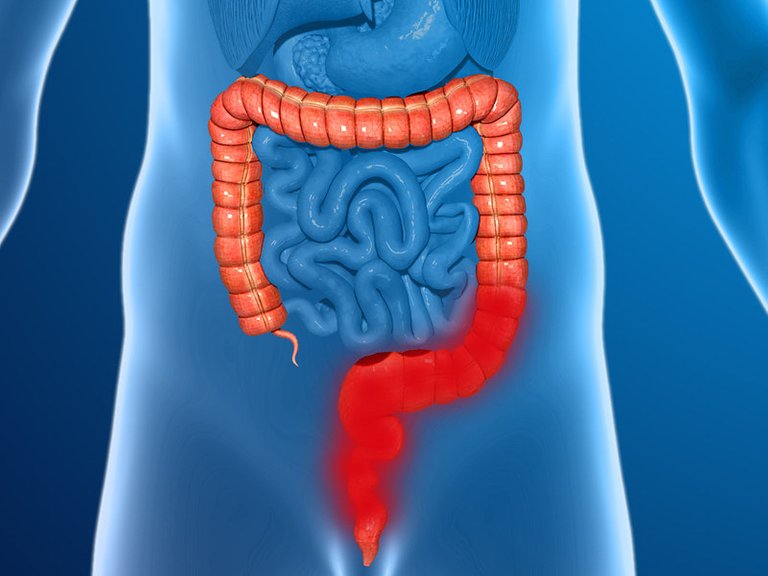Crohn's Disease, A Chronic Inflammatory Bowel Disease.
There is a certain disease type that makes the human digestive tract swell and gets irritated, the disease is called Crohn's Disease, which is a long-term, chronic autoimmune inflammatory bowel disease that affects the digestive tract. Crohn's disease is regarded as an auto-immune medicated inflammatory condition where the immune system starts to attack the body cells, it does this, thinking they are harmful when they are not actually. This disease can affect any part of the gastrointestinal tract (GI), from the mouth to the anus, the symptoms affect the intestinal system, but they also can have the ability to affect the bones, eyes, joints, kidneys, liver, and skin.

flickr.com
There are five types of Crohn's disease, based on the research published by Crohn’s and Colitis Foundation, they are;
Ileocolitis: This is the most common type of the disease, it affects the end part of the small as well as the large intestine or the colon.
Ileitis: Affects just the ileum, or the small intestinal part.
Gastroduodenal Crohn's disease: Affects the stomach as well as the duodenum, which happens to be the beginning of the small intestine.
Jejunoileitis: Causes inflammation patches in the jejunum, the upper region of the small intestine.
Crohn's colitis affects only the colon.
For a person with Crohn's disease, the bacteria in the digestive tract could trigger an immune response that occurs continuously, leading to ongoing intestinal damage.
The symptoms of Crohn's disease greatly depend on the affected part of the guts;
Pain is one of the symptoms of chron's disease, the level of pain felt is dependent on the inflammation of the gut, humans experience pains based on the lower right region of the abdomen.
Mouth ulcers are also common symptoms of Crohn's disease.
Ulcers in the gut are raw areas that may bleed and when this happens, the affected person may find blood in their stools. Diarrhea is also a symptom of Chron's disease, and the level of diarrhea ranges from mild to severe level, it has associated symptoms like blood, mucus, or pus, and there could also be the urge to feel bowel movements but nothing will come out.
Feeling tired or having feelings of fever is also an associated symptom.
Rectal bleeding and anal fissures, where the skin of the anus gets cracked leading to severe pain and bleeding. Weight loss, appetite loss, and anemia are also symptoms of chron's disease.
During a flare of Chron's disease symptoms, other types of development may occur including; uveitis, skin rash and inflammation, arthritis, delayed growth, bile or liver duct inflammation, and sexual development in children.
Most females who develop Crohn's disease often do so before they get to the age of 35, the symptoms of Crohn's disease in the female gender include;
- Painful sex.
- Irregular menstruation as a result of effects on the hormone function.
- Discomfort during sex.
- Iron deficiency.
Having a type of inflammatory bowel disease like Chron's disease does not prevent a woman from getting pregnant, but a person with such disease may however experience preterm delivery, require a cesarean delivery, or give birth to an infant with low birth weight.
The main cause of Chron's disease is not so clear, but these factors will contribute to the chances of its development; the immune system, environment, and genes. Certain passage of humans with Crohn's disease usually get it from their parents or family members, some other factors that could increase the severity of the condition are; age, smocking, the involvement of the rectum, and how long the disease has lasted.
People with Crohn's disease are more likely to grow intestinal infections from bacteria, parasites, viruses, and fungi, which can turn out to affect how severe the symptoms are as well as create complications. The treatment of the infection can also affect the immune system making the infection worse.
Yeast infection is a common type of Crohn's disease affecting both the lungs and the intestinal tract, it is very necessary that the infections are diagnosed and appropriately treated with antifungal medications, this is to prevent further complications from occurring.
To diagnose Crohn's disease, the doctor will ask questions relating to the symptoms felt, a physical test will first be carried out revealing a lump in the abdomen resulting from when loops of inflamed bowels get stuck together. Tests that will help with the diagnosis include; Biopsy, colonoscopy, stool and blood tests, endoscopy, sigmoidoscopy, and CT scan. Treatment of Crohn's disease will help with its management, but there is no cure for the disease, the treatment options involve; medications, nutritional supplements, and surgery. The treatment aims to help control inflammation, help relieve symptoms, reduce the occurrence of flares, and help resolve the existing nutritional issue. Treatment course will be highly dependent on, existing complications, the point where the inflammation occurs, how severe the problem is, and how fast and soon response to treatment could be.
Summary.
Crohn's disease is a long-term chronic disease that causes inflammation in the digestive tract, it could be painful, reducing the quality of life and creating some life-threatening complications. A person who has Chron's disease must be able to manage symptoms with medications, reduction of stress, and other available approaches, in most cases, surgery will be required.
Thanks for your contribution to the STEMsocial community. Feel free to join us on discord to get to know the rest of us!
Please consider delegating to the @stemsocial account (85% of the curation rewards are returned).
Thanks for including @stemsocial as a beneficiary, which gives you stronger support.
My dad had Crohn's. Lowers quality of life significantly, like many autoimmune diseases.
So sorry to hear that, how was he able to manage?
Drugs, mostly.
I would like to inform you or rather your father about three links:
1.) http://naturesplatform.com
2.) http://inclinedbedtherapy.com
3.) https://www.normalbreathing.com/how-to-improve-digestion/
If he already passed, perhaps someone else will read this and can benefit from it. Sorry that I did not notice the "had".